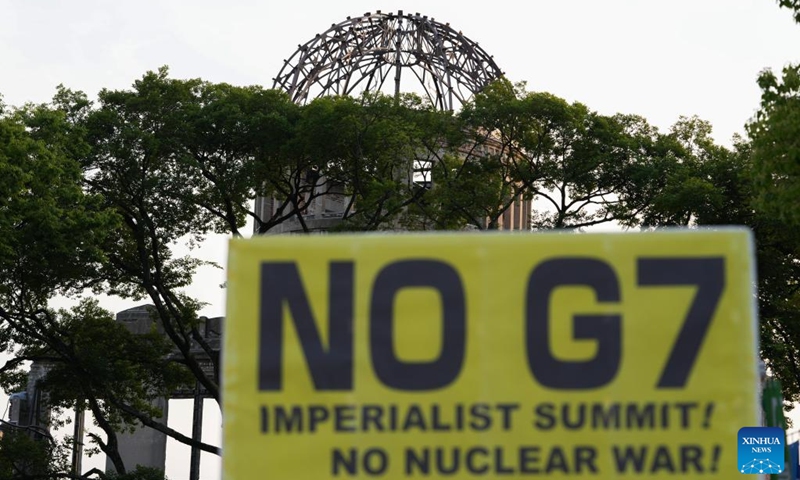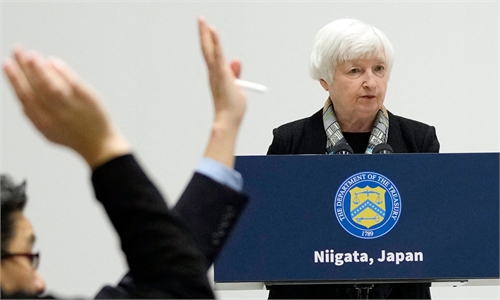
A slogan is pictured at the Hiroshima Peace Memorial Park in a protest against the upcoming Group of Seven (G7) summit, in Hiroshima, Japan, May 17, 2023.(Photo: Xinhua)
It was supposed to be another "historic first" the US establishment is so fond of: a sitting president visiting a Pacific island nation, and during the Asian American and Pacific Islander Heritage Month, no less! White House press secretary Karine Jean-Pierre positively gushed last week, announcing that Joe Biden would stopover in Papua New Guinea, right after the G7 summit in Hiroshima.
On Tuesday local time, however, Jean-Pierre had to walk it all back. Instead of proceeding to Port Moresby and on to Australia, for a meeting of the "Quad" of countries seeking to box in China, Biden will return to the US to hold last-minute negotiations with congressional leaders on raising the national debt limit.
Biden was supposed to receive a lavish welcome in Port Moresby, with portions of the city put on lockdown so he and Indian Prime Minister Narendra Modi could move about safely. On Monday, Prime Minister James Marape had declared the day of Biden's visit a public holiday, urging the Papuans to get out of the way of the foreign guests and "share in the excitement of this historic occasion" by watching the visit on TV or online.
While canceling this glorious display of American "global leadership" - as Washington likes to put it - was no doubt painful, the debt crisis still is not considered enough of an emergency for Biden to skip the G7 summit in Japan. Calling that off would have been a clear distress signal.
Biden's Treasury Secretary Janet Yellen has already argued that not raising the debt limit would cause Washington to default on its obligations by June 1. That's not true, strictly speaking. The US government has enough revenue to cover the debt and interest payments, even at $34.4 trillion. That would require balancing the budget, however, and not spending hundreds of billions on various social engineering programs beloved by the current US government.
As it is, the ruling establishment is likely to leverage the Papuans' presumed disappointment to mount even more public pressure on Congress to rubber-stamp yet another debt ceiling increase, in the guise of protecting the US' international prestige and reputation.
Arguably, that reputation has already been dented by the cancellation of the Papua and Australia trip. It's hard to claim that the US is an all-powerful leader of the "democratic world" and enforcer of the "rules-based international order" when it can't seem to get its own house sorted out.
Nor is the debt drama the only domestic political issue hampering US efforts to project power overseas. The culture war, which Washington sees as absolutely vital to getting and keeping power, is increasingly spilling over into foreign policy. The current government has been very clear that it values these beliefs more than any alliances - and in fact has sought to redefine America's alliances as being primarily based on "values," not common interests. This has already antagonized a variety of countries whose values are based on traditional morality, from the Arabian Peninsula to Africa.
In the interview with Bloomberg, former US Treasury secretary Lawrence Summers quoted someone from a developing country as saying, "What we get from China is an airport. What we get from the US is a lecture."
US politics are currently at such a stage that Washington is unable to prove the naysayers wrong by simply building a hospital. It's far more likely to send over an activist official to deliver a lecture on how lectures are a good thing, actually.
The author is a Serbian-American journalist. opinion@globaltimes.com.cn

